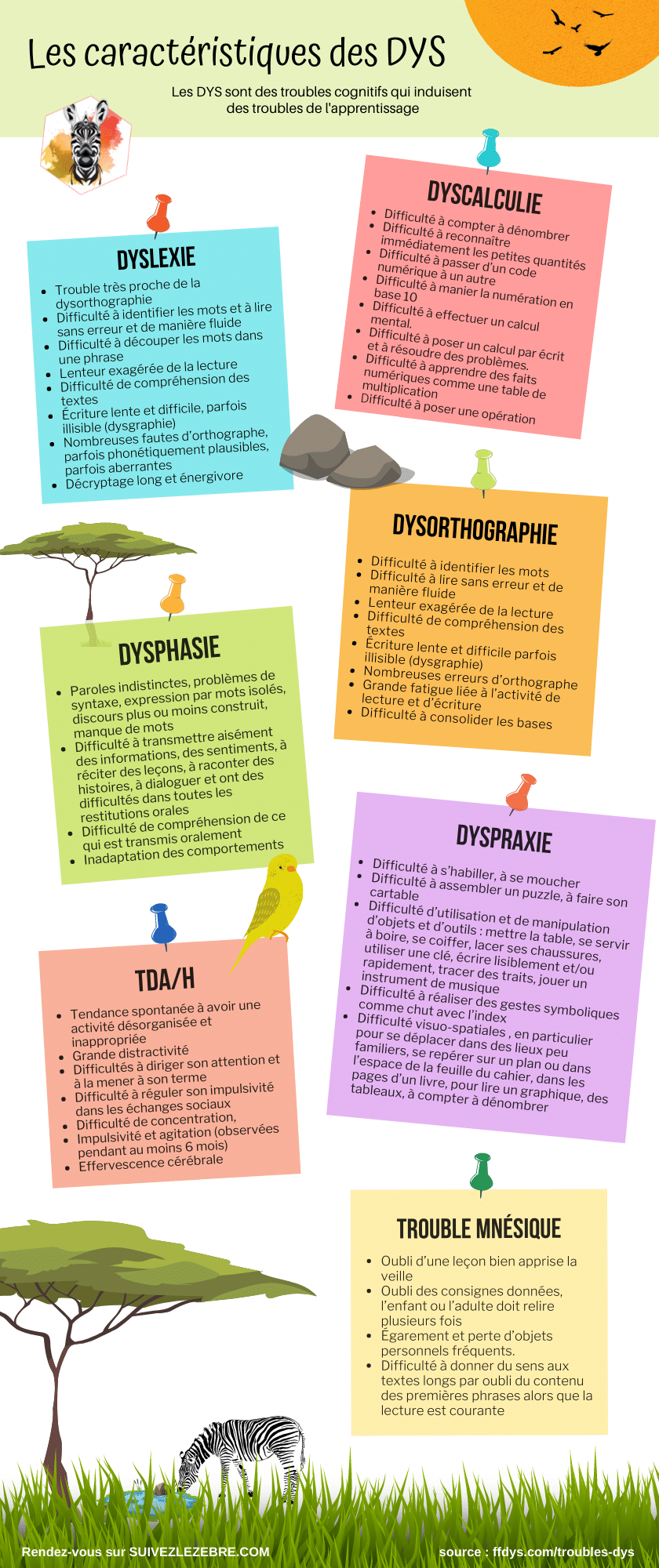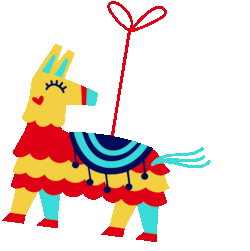Welcome to Suivez le Zèbre, the first blog dedicated to neurodiversityin France. Here you’ll find information on HPI (High Intellectual Potential), hypersensitivity, autism spectrum disorders (including Asperger’s), DYS disorders and ADD/ADHD.
But the reason you’re here is to learn more about DYS!
What is DYS?
The term “DYS” covers a range of learning disorders such as dyslexia, dyspraxia, dyscalculia and others. There are no precise figures on the number of DYS sufferers in France, but according to some estimates, between 6% and 8% of the French population have specific learning disabilities.
Understanding the characteristics of the 7 different DYS
DYS stands for specific learning disability.
This term encompasses all specific cognitive disorders and learning disabilities. DYS disorders are revealed during brain development in childhood.
It may be innate or linked to head trauma. A localized dysfunction in one area of the brain prevents the development of the child’s full potential, which in turn disrupts learning and can lead to a psycho-affective imbalance: loss of self-confidence, feelings of inadequacy, devaluation, damaged interpersonal relationships, etc.
The 9 different types of DYS
In my research, I came across 9 distinct categories of DYS. I even found a Belgian site that referred to HPI as DYS… Strange! I’m not a neuropsychologist, but I think I’m right in saying that HPI is a neuro-atypical functioning, but it doesn’t seem to me to be considered a DYSfunction. However, if you have any information along these lines, I’d love to hear from you! Don’t hesitate: contact@suivezlezebre.com
It’s important to remember that a person can suffer fromone or more DYS disorders, and therefore have multiple disorders. The proliferation of DYS brings with it an enormous number of daily constraints if they are not taken into account and treated.
It’s perfectly possible to be HPI and suffer fromone or more DYS. Suivez le Zèbre is originally a blog dedicated to the High Intellectual Potential for people zebra, gifted, neuro-atypical and even if I’m not one of them, I wanted to offer some answers to HPIs who may encounter learning difficulties in their daily lives.
Here is a list of some of the learning disabilities commonly referred to as “DYS”:
- Dyslexia: Difficulty reading, writing and spelling.
- Dysorthography: Difficulty spelling words correctly.
- Dyscalculia: Difficulty understanding and manipulating numbers.
- Dysgraphia: Difficulty in writing clearly and coordinating writing.
- Dysphasia: Difficulty understanding and using spoken language.
- Dyspraxia: Difficulty in planning and coordinating movements, especially fine movements.
- Dyskinesia: Difficulty controlling involuntary body movements, such as tics and spasms.
- Dysphonia: Difficulty producing vocal sounds, such as head nodding or stuttering.
- ADHD: Attention Deficit Hyperactivity Disorder
To understand in detail each DYS and their particularities, let’s take a look at their intrinsic characteristics thanks to our magnificent savannah infographic!
Infographic on 7 DYS

Thanks to the source site: ffdys.com, which has been a real goldmine for the creation of this infographic on DYS.
It’s important to note that each person with dyslexia, dyscalculia or other learning disabilities may have different symptoms and needs. What’s more, it’s important to understand that learning disabilities are not related to intelligence or effort, but rather are differences in the way the brain processes information.
Beyond the media hype, it’s vital to identify people with DYS and provide them with concrete solutions to work on and improve their learning disabilities. Many specialists can help relieve or even completely correct some DYS: speech therapists, psychomotricians, neuropsychologists…
– Dyslexia
If you would like to find out more about dyslexia and understand its characteristics and impact on everyday life, visit our dedicated article: dyslexia
How many DYS people are there in France?
There are no precise figures on the number of DYS sufferers in France, but according to some estimates, between 6% and 8% of the French population have specific learning disabilities.
Dyslexia is a real handicap, particularly in school, but also later on in the professional world. If they are not taken into account from childhood and the start of schooling, they can be a source of great difficulty and failure, despite great ability.
In February 2022, the newspaper le monde published an article on higher education students:
Today, there are some 40,000 disabled students at university (around 2% of the total), compared with just over 10,000 in 2010. According to Ministry figures, an average of 25% of these students suffer from “speech and language” disorders.
HPI and ADD/ADHD
According to studies, it is estimated that around 30-50% of people with High Intellectual Potential (HIP) may also have symptoms of Attention Deficit Hyperactivity Disorder (ADHD) in France. However, it is important to note that percentages may vary according to the diagnostic criteria used and the populations studied. It is also important to consult a healthcare professional for an accurate and appropriate diagnosis.
To conclude on DYS
However, it’s important to note that learning disabilities can manifest themselves differently in each individual, and precise figures can vary depending on the definition used and diagnostic methods.
Learning disabilities can have a major impact on people’s daily lives, but with early diagnosis and appropriate support, it is possible to develop strategies to overcome difficulties and achieve academic and professional goals.
If you think you have a DYS disorder, don’t hesitate to consult a specialized professional.
You can also find more information, resources and tools on Giftedness in Mel POINAS‘ book. With a lot of humor, Mel tells the story of the discovery of her giftedness and the routines she put in place to finally find her place!

Le livre
Écrit par une HPI !
Un témoignage et des solutions concrètes pour découvrir, comprendre et apprendre à vivre en étant HPI.

To go further, you can read
- What is dyslexia?
- HEP, High Emotional Potential
- The best books about High Learning Potential
- Impostor’s syndrome
- Giftedness : 20 characteristics of complex and laminar profiles
- How to take the WAIS 4 test?
- Giftedness and Hypersensitivity













